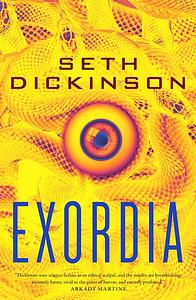You need to sign in or sign up before continuing.
Take a photo of a barcode or cover
adventurous
dark
emotional
reflective
tense
medium-paced
Plot or Character Driven:
Character
Strong character development:
Yes
Loveable characters:
Yes
Diverse cast of characters:
Yes
Flaws of characters a main focus:
Yes
challenging
dark
emotional
reflective
tense
Definitely a book to love or hate. A bit self-aggrandizing, but competent enough to be excused for it. Packed very full of brazen erudition, often more quantity than quality, but the sheer scope and craziness makes it worth pushing through.
Graphic: Body horror, Drug use, Genocide, Gore, Suicide, Religious bigotry
Exordia has some fun and interesting ideas going on that make for compelling worldbuilding. I loved the opening act that read like Fleabag crossed over with This Is How You Lose The Time War. That act was the kind of book I expected to keep reading, but the following story beats took a huge turn to a sci-fi military drama that fans of Destiny will feel familiar with. The plot development was interesting enough to follow that I looked forward to opportunities to open the book back up, but somehow the pacing slowed while information and dialogue continued to be piled on. For example, Dickinson has a habit of revisiting arguments and expository beats that were already explained in earlier chapters. Conflicts seem to drift around in tepid circles. I started skimming pages and realized we were still talking about the relationship drama that had been explained many times. It was frustrating and felt like a poor use of my time to reread character backstories presented in different words. I skipped to the last act and am pleased that the last 100 pages seem a little more forward-moving... even if there are still problems being brought up that were introduced many chapters ago. Ultimately, I like what this book offers as a starting point and would love to see authors playing around with the ideas that Seth Dickinson puts forward. I'm looking forward to reading his other works to see what he does with different settings.
adventurous
challenging
dark
funny
slow-paced
Plot or Character Driven:
A mix
Strong character development:
Yes
Loveable characters:
No
Diverse cast of characters:
Yes
Flaws of characters a main focus:
Yes
challenging
dark
informative
tense
medium-paced
Plot or Character Driven:
A mix
Strong character development:
Complicated
Loveable characters:
Complicated
Diverse cast of characters:
Yes
Flaws of characters a main focus:
Yes
adventurous
dark
tense
5 stars bc only few books grab my attention within the first pages and make me read 300 pages before stopping.
But I almost gave it 4 stars bc after a brilliant start it kinda fizzles out? We get lots of math and physics and more confusing stuff anda threesome , the end.
This is one of the books that will stay with you for a while. The whole morality concepts really read like they are a better version than what Bakker tried to do in his books.
I hope there will be a sequel!!
But I almost gave it 4 stars bc after a brilliant start it kinda fizzles out? We get lots of math and physics and more confusing stuff and
This is one of the books that will stay with you for a while. The whole morality concepts really read like they are a better version than what Bakker tried to do in his books.
I hope there will be a sequel!!
Exhausting, thought-provoking, stomach-turning, blood-pumping, overall pretty incredible. I’m glad I’ll never have to read it again.
adventurous
challenging
dark
emotional
mysterious
reflective
sad
tense
slow-paced
Plot or Character Driven:
A mix
Strong character development:
Complicated
Loveable characters:
Complicated
Diverse cast of characters:
Yes
Flaws of characters a main focus:
Yes
adventurous
challenging
dark
emotional
funny
informative
tense
medium-paced
Plot or Character Driven:
A mix
Strong character development:
Complicated
Loveable characters:
No
Diverse cast of characters:
Yes
Flaws of characters a main focus:
Yes
Like some of my other fellow readers have noted, this book begins brilliantly with a hilarious and bewildering relationship between a girl and her alien. Ssrin the alien was truly alien, and I thoroughly enjoyed the Exordia's bizarre technology that was somehow based on the soul and... narrative? While I enjoyed it, I wouldn't say I understood it, but I was really enjoying the ride. The story was intimate and clever, and the stakes were low compared to what they quickly ballooned into.
Then, very early on, the book took a sharp heel turn into the world of the military and global operations and became something completely different. The wonderful dynamic between Anna and Ssrin was unceremoniously shoved into the background to make way for two strong yet uninteresting super-males, Erik and Clayton, around which much of the narrative proceeded. I really missed Anna and Ssrin, and that was underscored every time they reappeared.
Anyhow, prepare to be challenged. Once it left the small, tight narrative of Anna's apartment, it exploded into different characters, timelines, and voices. Dickinson kept layering in different factions: Iran, Russia, China; he set the scene with an avalanche of jargon and terminiology. The jargon added to the realism, I suppose, but you've just got to let it wash over you; it's excessive and... who is it really even for?
There is true brilliance in this book. But while I enjoyed the explosion of ideas, I couldn't help but wonder what it would have been like in the hands of a disciplined editor who could rein in the fizzy, burgeoning concepts that Dickinson wrote about... all at once. Maybe both books -- edited and editor-free -- would have been good? Perhaps it really was the breathless, insane narrative that made it engaging.
Then, very early on, the book took a sharp heel turn into the world of the military and global operations and became something completely different. The wonderful dynamic between Anna and Ssrin was unceremoniously shoved into the background to make way for two strong yet uninteresting super-males, Erik and Clayton, around which much of the narrative proceeded. I really missed Anna and Ssrin, and that was underscored every time they reappeared.
Anyhow, prepare to be challenged. Once it left the small, tight narrative of Anna's apartment, it exploded into different characters, timelines, and voices. Dickinson kept layering in different factions: Iran, Russia, China; he set the scene with an avalanche of jargon and terminiology. The jargon added to the realism, I suppose, but you've just got to let it wash over you; it's excessive and... who is it really even for?
There is true brilliance in this book. But while I enjoyed the explosion of ideas, I couldn't help but wonder what it would have been like in the hands of a disciplined editor who could rein in the fizzy, burgeoning concepts that Dickinson wrote about... all at once. Maybe both books -- edited and editor-free -- would have been good? Perhaps it really was the breathless, insane narrative that made it engaging.
challenging
dark
tense
medium-paced
Plot or Character Driven:
A mix
Strong character development:
Yes
Loveable characters:
Yes
Diverse cast of characters:
Yes
Flaws of characters a main focus:
Complicated






